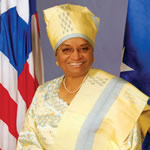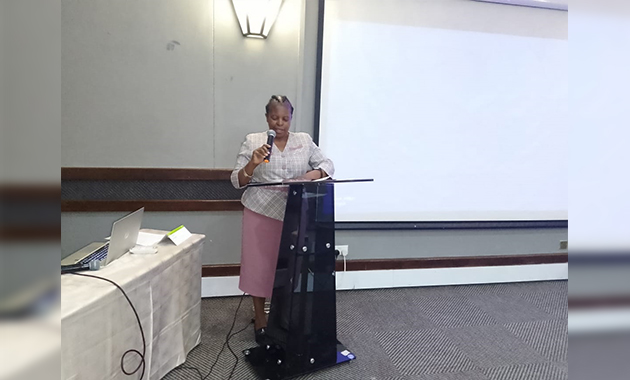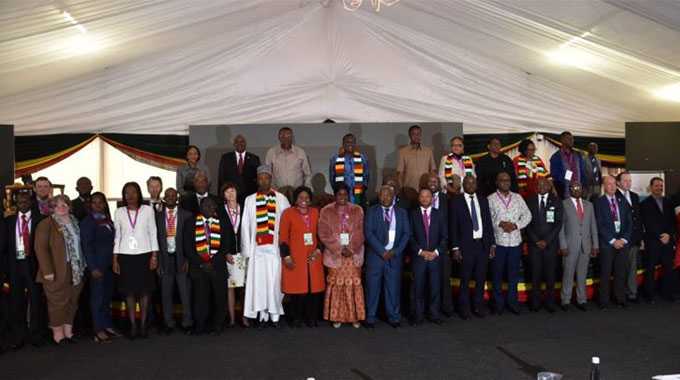Women climb up ladder in politics

the achievements that women have made in different professions and fields.
Women have made great strides in their respective lines of work: the media; arts (music, film); religion; politics; sport, the list is endless.
They are able to show progress in most of the careers they have been involved in but it is in politics that they have not made significant progress.
They seem to be going round and round in circles.
When they think they are registering progress, something happens that seems to pull them some steps back, or sometimes find them in a worse off situation.
The structures that society has put in place make it difficult for women to hold high positions in politics, since it is through politics that their destination is mapped.
By failing to be in this highest decision-making body, women have been affected in most of what they do.
Despite the difficult environments women operate in, they have worked hard and found their way at the top of the political ladder, although they are only a handful – a drop in the ocean compared to their male counterparts – we celebrate their achievements.
Some of the women who have made it to the pinnacle of the political ladder in Africa are; Joice Mujuru, Ellen Johnson-Sirleaf, Pumzile Mlambo-Ngcuka, Baleka Mbete and Thokozani Khupe.
Joice Mujuru was the Minister of Community Development and Women’s Affairs at the attainment of Zimbabwe’s independence in 1980.
At a Women’s Day rally on March 8, 1983, Joice Mujuru also known by her Chimurenga name Teurai Ropa Nhongo, urged women to press for their rights.
She told the meeting that the goal of Zimbabwe as a developing socialist state was equality for all citizens before the law.
She said, “Women participated in the national liberation struggle for human rights, and their resources must be made full use of in a mutually complementary manner, rather than in a master-servant relationship, which sma-cks of exploitation of one group by the other?”
On that same occasion, she urged women to join trade unions. Women, she said, could do as well as men if they were only given the chance.
But she pointed out that in Harare out of 86 councilors, only two were women, and Bulawayo had none. In Parliament, the body that represents the whole society, there were only 12 women out of 140.
She pointed out, too, that although the Government was the largest employer of labour, no woman yet sat on the Public Services Commission.
“These are the areas we need to transform,” she said. (Weiss 1986, 23)
The demands for women’s rights from almost all quarters of society including the highest echelons were growing.
Joice Mujuru held different posts in Government before she became Vice President on December 6 2004.
In 1985 she became Minister of State up to 1988. She then became Minister of Community Development, Cooperatives and Women’s Affairs up to 1992.
She was Governor and Resident Minister of Mashonaland Central Province up to 1996.
She also served as the Minister of Information, Posts and Telecommunications for a year, and in 1997 she was assigned Minister of Rural Resources and Water Development up to 2004 when she was appointed Vice President.
In 1973, Joice Mujuru left the country to join the liberation struggle, where she showed leadership qualities and rose through the ranks of Zanla, the armed wing of Zanu (PF). She became medical assistant, then military commander and Central Committee member.
The appointment of Mujuru as Vice President seemed to have opened gates for other women to the highest post in politics.
Ellen Johnson-Sirleaf became the first elected woman president in Africa in 2005 when she landed the post of president in Liberia.
Johnson-Sirleaf became the 24th Liberian president and the first woman to take up that position in her country. She is also the first and currently only elected female head of state in Africa.
After the end of the second Liberian civil war and the establishment of a transitional government, Johnson-Sirleaf was proposed as a possible candidate for chairperson of the government.
Johnson-Sirleaf once again stood for president as the candidate of the Unity Party in the 2005 general election.
On November 23 2005, Johnson-Sirleaf was declared the winner of the Liberian election and confirmed as the country’s next president. Her inauguration took place on January 16 2006. She served as Assistant Minister of Finance from 1972 to 1973 under Tolbert’s administration.
Johnson-Sirleaf resigned after getting into a disagreement about government spending. Subsequently she was Minister of Finance from 1979 to April 1980.
Master Sergeant Samuel Doe seized power in Liberia on April 12, 1980 in a military coup. Johnson-Sirleaf accepted a post in the new government as President of the Liberation Bank for Development and Investment but fled the country in November 1980. She initially moved to Washington DC to work for the World Bank before moving to Nairobi in 1981 to serve as Vice President of the African Regional Office of Citibank.
Johnson-Sirleaf resigned from Citibank in 1985 following her involvement in the 1985 election in Liberia and went to work for Equator Bank, a subsidiary of HSBC.
In 1992, Johnson-Sirleaf was appointed Assistant Administrator, then Director of the United Nations Development Programme’s Regional Bureau for Africa, from where she resigned in 1997 to run for president in Liberia.
During her time at the UN, she was one of the seven internationally eminent persons designated in 1999 by the Organisation of African Unity to investigate the Rwandan genocide; one of the five Commission Chairs for the Inter-Congolese Dialogue and one of two international experts selected by Unifem to investigate and report on the effect of conflict on women and women’s roles in peace building.
Johnson-Sirleaf was the initial Chairperson of the Open Society Initiative for West Africa (OSIWA) and a visiting Professor of Governance at the Ghana Institute of Management and Public Administration (GIMPA).
The year 2005 also saw Pumzilie Mlambo-Ngcuka of South Africa taking a high position in the political realm of her country.
On June 22 2005, President Thabo Mbeki appointed her as deputy president of South Africa. Pumzile Mlambo-Ngcuka became a Member of Parliament in 1994, chairing the Public Service Portfolio Committee.
She was deputy minister in the Department of Trade and Industry (DTI) from 1996 until 1999, during which time she also was a founding member of the Gugulethu Community Development Corporation.
From 1997, she served as member of the national executive committee of the African National Congress (ANC), as well as being the provincial vice-chairperson of the ANC Western Cape.
Mlambo-Ngcuka was Minister of Minerals and Energy from June 1999 to June 2005. During this time she was a driving force behind the government’s policy of creating New Order Mining Rights which ended a period where big mining firms which controlled nearly all South Africa’s mineral reserves, were able to hold mining rights to them in perpetuity.
Mlambo-Ngucka’s policy of “use it or lose it” created a situation where mining rights became available to a much broader segment of the population including many previously disadvantaged black people. She served as acting Minister of Arts, Culture, Science and Technology from February 2004 to April 2004.
Mlambo-Ngcuka was Vice President of South Africa up to 2008 and was succeeded by Baleka Mbete who is also a powerful woman in South African politics. Before September 22, 2004 Mbete was speculated to succeed Mbeki as President, which would have made her the first female head of state in South Africa’s history.
However, the ANC announced that Kgalema Motlanthe, the Deputy President of the ANC, would assume that position.
On 25 September 2008, she was appointed by Motlanthe as Deputy President. On May 10 2009 she was replaced as Deputy President by Motlanthe who was appointed by Jacob Zuma as his deputy.
A trade unionist, Thokozani Khupe became Deputy Prime Minister of Zimbabwe in 2009.
Could she have heeded the call by then Minister of Community Development and Women’s Affairs, Joice Mujuru who encouraged women to join trade unions in 1983?
Thokozani Khupe served in the Zimbabwe Amalgamated Railway Union (ZARU) in 1987.
In 1991 she was elected Secretary for the ZCTU Women’s Advisory Council and also a General Council member of the ZCTU. In 1999 she participated in the formation of the Movement for Democratic Change party, in which she was elected as a National Executive member responsible for Transport, Logistics and Welfare.
In June 2000, she was elected Member of Parliament for Makokoba Constituency in Bulawayo. Thokozani Khupe has been the Deputy Prime Minister of the Government of National Unity since February 11 2009.
She is also the Vice President of the Movement for Democratic Change (MDC-T) whom she represents in Parliament.
We celebrate the achievements of the few women who have held the highest positions in the African political sphere.
They have followed in the footsteps of those who came before them during the pre-colonial era.
Some of the women who led their countries in Africa are, Queen Hatsheput (ca 1490-68), Queen Candace, Empress of Ethiopia and General-in-Chief of its armies (3rd century BC – 2nd century AD), Queen Cleopatra (ca 69-30 BC), Queen Nzinga of Angola and Ndongo (ca 1581 – 1663), Queen Aminatu of Nigeria (16th century), Queen Mma Ntatise of the Ba Tlokwa (present day Natal), Nehanda of Zimbabwe (ca1862 -98) and Yaa Asantewa of the Asante (ca 1840/60-1921). We celebrate all your efforts and achievements!
[email protected]









Comments